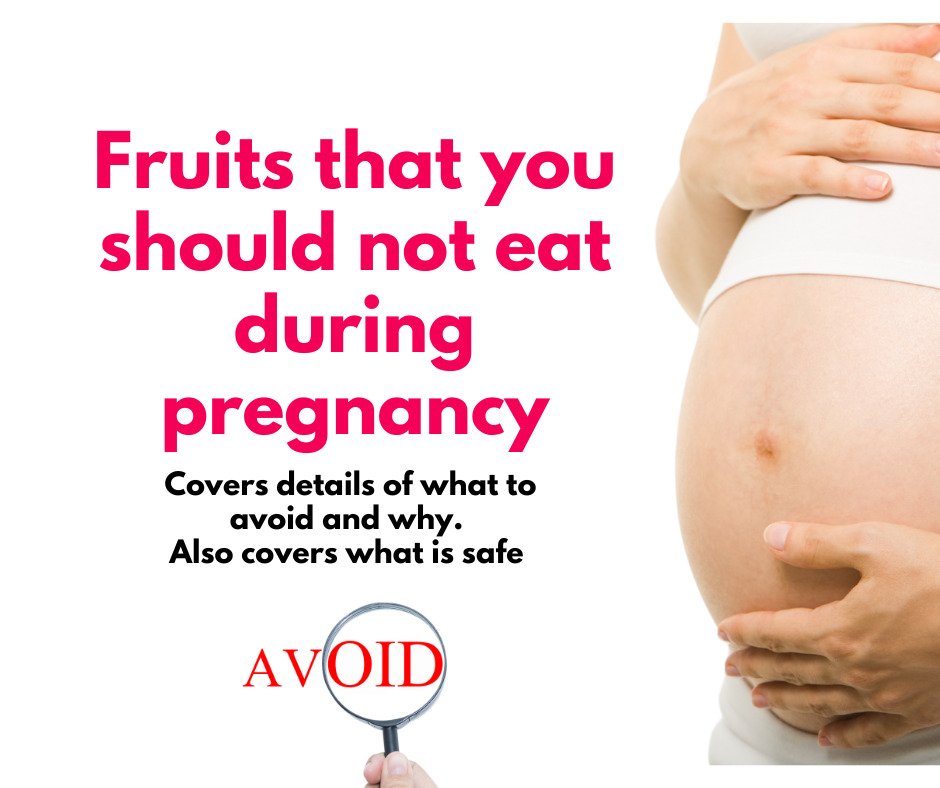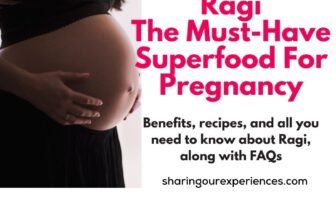
Pregnant women often ask themselves what they can and cannot eat. There are many foods that should be avoided during pregnancy, for both the mother’s and baby’s health.
In this blog post, we will discuss fruits that pregnant women should avoid. These fruits may contain harmful toxins or bacteria that can cause problems for both the mother and baby. So if you’re pregnant, make sure to avoid these fruits!
Fruits to avoid during pregnancy:
Pregnancy is a time when it is important to be extra careful about what you eat. By avoiding these fruits, you can help ensure a healthy pregnancy for both you and your baby.
Be sure to talk to your doctor before consuming any type of fruit or vegetable during pregnancy, just to be on the safe side.
Papaya – Why Papaya is not good for pregnant women
There are a few reasons why papaya is not considered safe for pregnant women. For one, papaya contains latex, which can trigger contractions and lead to premature labor. Additionally, the unripe fruit contains compounds that can actually block progesterone production, which is essential for a healthy pregnancy. Finally, papayas can be host to harmful bacteria and parasites that can cause serious illness in pregnant women. So while a small amount of ripe papaya may not be harmful, it’s best to avoid it altogether during pregnancy.
So there you have it! While papayas may be delicious and nutritious, they’re best avoided during pregnancy.
Grapes – Why avoid Grapes during pregnancy
Grapes are one of the most popular fruits, and for good reason. They’re sweet, juicy, and easy to eat. But if you’re pregnant, you may want to avoid them.
Grapes contain a compound called resveratrol, which has been linked to birth defects. In one study, women who ate grapes during pregnancy were more likely to have babies with neural tube defects.
So, if you’re pregnant, it’s best to avoid grapes. Choose other fruits instead, such as apples.
Pineapple – Why Pineapple is avoided for pregnant women
Pineapple is not good for pregnant women because it can cause miscarriages. Pineapples contain a chemical called bromelain, which can soften the cervix and lead to miscarriage. Bromelain is also an enzyme that breaks down proteins, and it can sometimes be used as a meat tenderizer. So, if you’re pregnant, it’s best to avoid pineapple.
In addition to bromelain, pineapples also contain high levels of vitamin C. While vitamin C is good for you in general, it can actually increase the risk of miscarriage if you consume too much of it during pregnancy. So, if you’re pregnant, you should limit your intake of pineapple to no more than one small cup per day.
Pineapple is also a diuretic, which means it can make you urinate more frequently. This can lead to dehydration, which is dangerous for both you and your baby during pregnancy.
So, if you’re pregnant, it’s best to avoid pineapple.
Tamarind – Why Tamarind is not good for pregnant women
Tamarind is a tropical fruit that is often used in Asian cuisine. The fruit is high in vitamins and minerals, making it an excellent choice for pregnant women. Tamarind can be eaten fresh, dried, or cooked. It can also be made into a paste or juice. When eating tamarind during pregnancy, it is important to talk to your doctor about the appropriate amount to eat. Eating too much tamarind can cause stomach upset and diarrhea.
Tamarind is extremely rich in Vitamin C. If consumed in excess it can suppress the production of progesterone in your body.
Tamarind is a popular fruit in many parts of the world, but pregnant women should avoid eating it. Tamarind can cause miscarriages and birth defects. It is also a diuretic, which can lead to dehydration in pregnant women. If you are pregnant, talk to your doctor before eating tamarind.
Bananas – Why Bananas may not be good for pregnant women
Bananas are a good source of folic acid, which is important for the development of the neural tube. However, they also contain a high amount of sugar and carbohydrates, which can lead to weight gain and gestational diabetes. Additionally, bananas are a common allergen for pregnant women, and can cause stomach upset and diarrhea. Therefore, it is best to avoid eating bananas during pregnancy.
Pregnant women need to be especially careful about what they eat because their bodies are going through so many changes. Bananas might seem like a healthy snack but there are actually some pretty good reasons why pregnant women should avoid them.
So if you suffer from allergies, diabetes or gestational diabetes please consult your doctor.
Watermelon – Why Watermelon is not good for pregnant women
Watermelon enables body to flush out toxins but during pregnancy it may have certain undesirable effects.
Watermelon is not good for pregnant women because it can cause indigestion and heartburn. Additionally, watermelon contains a high level of natural sugar, which can lead to gestational diabetes. Finally, watermelon is a diuretic fruit, which means it can increase the risk of dehydration during pregnancy. Therefore, it is best to avoid watermelon during pregnancy.
However, if you do eat watermelon, be sure to drink plenty of fluids and eat other fruits and vegetables as well to balance out the diuretic effect.
Dates – Why eating dates is not good for pregnant women
Dates are rich in nutrients and have a high fiber content, which can help in keeping you regular. They are also a good source of potassium, which is important for maintaining healthy blood pressure levels. dates can help you meet your daily recommended intake of fruits and vegetables.
There are a few reasons why eating dates is not recommended for pregnant women. Dates are high in sugar and can cause blood sugar spikes, which can be dangerous for pregnant women. Dates are also high in natural fruit acids, which can lead to stomach upset and diarrhea. Finally, dates contain sulfur, which can trigger allergies in some people.
Dates may cause the body to heat up and may even lead to uterine contractions.
So eating a date or two may be good as they are rich in nutrients but anything more can lead to complications.
Frozen berries – Why avoid Frozen Berries during pregnancy
Frozen berries are a convenient and relatively healthy snack option, but they may not be the best choice for pregnant women. Some frozen berries contain listeria, a type of bacteria that can cause serious illness in pregnant women and their babies. Listeria can lead to miscarriage, stillbirth, or premature delivery.
Pregnant women should avoid eating any raw or unpasteurized foods, including berries. Frozen berries may be contaminated with listeria even if they have been washed. It is best to play it safe and avoid them altogether.
If you are pregnant and craving berries, opt for fresh or canned berries that have been pasteurized. These have been heated to a high enough temperature to kill any bacteria, including listeria.
Canned Tomatoes – Why avoid Canned Tomatoes during pregnancy
Canned tomatoes can be a sneaky source of BPA.
BPA is a synthetic estrogen that has been linked to a variety of health problems, including infertility, in both men and women.
Pregnant women are especially vulnerable to the effects of BPA because it can disrupt the development of the fetal brain and reproductive system.
So, if you’re pregnant, it’s best to avoid canned tomatoes (and other canned foods) as much as possible.
There are plenty of fresh and frozen options available that don’t come with the same risks. So, next time you’re at the store, make sure to reach for those instead.
Your baby will thank you!
Fruits to avoid during pregnancy second trimester
The second trimester is a crucial time for your baby’s development. Here are some fruits to avoid during pregnancy second trimester.
Papayas are one of the fruits to avoid during pregnancy second trimester. They contain a latex compound called carpaine that can stimulate contractions and lead to premature labor.
Pineapples also contain bromelain, an enzyme that can soften the cervix and lead to premature labor.
Green mangoes contain toxic substances that can cause birth defects.
Grapes contain resveratrol, a compound that can lead to birth defects.
So, these are some of the fruits to avoid during pregnancy second trimester. Eat healthy and stay safe!
How Much Fruits Should You Eat During Pregnancy?
You should aim to eat at least two servings of fruit every day during pregnancy. This doesn’t have to be all at once, and you can mix it up however you like. For example, you could have a small piece of fruit with breakfast, a smoothie for snack, and then some sliced fruit with dinner.
There are plenty of benefits to eating fruit during pregnancy. Not only is it a great source of nutrients like vitamins C and folic acid, but it can also help you stay hydrated and regulate your blood sugar levels. Plus, snacking on fruit is a great way to satisfy your sweet cravings without overindulging.
So go ahead and enjoy all the delicious fruits available to you during pregnancy.
Types of fruits to avoid during pregnancy
Pregnant women should avoid these 11 types of fruits to stay safe and healthy during pregnancy. Eating a balanced diet is important for both the mother and baby’s health, so make sure to talk to your doctor or healthcare provider about what foods to avoid during pregnancy.
– Unripe fruits
– Fruits with pits or stones
– Moldy fruits
– Fruits that are too sweet
– Acidic fruits
– Canned fruits
– Dried fruits
– Frozen fruits
– Juiced fruits
– Raw fruits
Unripe fruits, such as bananas, avocados, and melons, can contain harmful toxins that can cause problems for both the mother and baby. Fruits with pits or stones, like cherries and apricots, can also be dangerous as they may contain harmful bacteria. Moldy fruits should also be avoided as they may contain toxins that can cause illness.
Fruits that are too sweet, like grapes can cause problems for the baby’s developing teeth. Acidic fruits, like lemons and limes, can cause heartburn and indigestion. Canned fruits often contain added sugars and preservatives that can be harmful to both the mother and baby. Dried fruits may also contain added sugars and should be avoided. Frozen fruits may contain bacteria that can cause illness. Juiced fruits are often high in sugar and should be limited during pregnancy. Raw fruits may contain harmful toxins or bacteria that can cause food poisoning.
Can Pregnant Women Drink Fruit Juice?
Always prefer fresh fruits to juices.
Here are a few things to keep in mind when deciding whether or not to drink fruit juice while pregnant:
– Check with your doctor first: as with anything else, it is always best to check with your doctor before making any changes to your diet during pregnancy. They will be able to give you specific advice based on your individual health needs.
– Choose 100% fruit juices: when shopping for fruit juices, be sure to choose ones that are 100% fruit juice with no added sugars. This will help you avoid consuming too much sugar, which can be harmful for both you and your baby.
– Avoid unpasteurized juices.
– Limit your intake: even though fruit juices are healthy, it is important to limit your intake to no more than one cup per day. This will help ensure that you get the nutrients you need without overdoing it on the sugar.
By following these guidelines, you can enjoy fruit juice as part of a healthy diet during pregnancy. Just be sure to check with your doctor first and to choose 100% fruit juices with no added sugars. And remember to limit your intake to one cup per day or less. With a little planning, you can have juice.
Which juice is good for pregnant women
Prefer fresh fruits to juices at all times.
Though there are many different types of juices that can be beneficial for pregnant women. Some of the best options include orange juice, grapefruit juice, and cranberry juice. These juices are packed with nutrients that can help support a healthy pregnancy.
Another great option for pregnant women is green smoothies. Green smoothies are a great way to get in plenty of leafy greens, which are an important part of a healthy diet during pregnancy. If you’re looking for a delicious and nutritious green smoothie recipe, check out this one from Healthline.com.
Finally, don’t forget about water! Staying well-hydrated is essential for all pregnant women, and juicing can be a great way to up your water intake
Which Fruits Are Safe to Consume During Pregnancy?
Pregnant women should consume at least four servings of fruits per day. However, not all fruits are created equal when it comes to safety during pregnancy. Some fruits contain high levels of mercury, which can be harmful to the developing baby. Other fruits may contain chemicals that can cause birth defects.
So, which fruits are safe to consume during pregnancy? Here is a list of seven safe options:
Apples: Apples are a good source of fiber and antioxidants. They are also low in mercury.
Blueberries: Blueberries are a good source of antioxidants. They are also low in mercury.
Cantaloupe: Cantaloupe is a good source of vitamin C. It is also low in mercury.
Grapefruit: Grapefruit is a good source of vitamin C. It is also low in mercury.
Strawberries: Strawberries are a good source of antioxidants and fiber. They are also low in mercury.
You can also have pomegranates, guava, pears and oranges. Eat fruits like mango in moderation.
Always Talk to your doctor or healthcare provider about what other foods you should avoid during pregnancy.
Pregnancy is a time when it is important to be extra careful about what you eat.
Fruits are an important part of a healthy diet during pregnancy. They provide essential nutrients, such as vitamins and minerals, which are necessary for the development of the baby. In general, it is best to eat fruits that are in season. This is because they are usually fresher and have more nutrients.
Thank you for reading! 🙂 Fruits to Avoid During Pregnancy for the Safest and Healthiest Baby. I hope this information was helpful. Please share this blog post with your friends and family if you found it helpful.
And be sure to check out our other blog posts for more helpful tips and information!
What are some other foods pregnant women should avoid? Share in the comments below!







